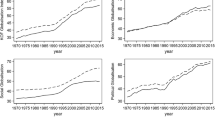Abstract
Fogel and North, both of them old radicals in the 1950s, received the Nobel Memorial Prize in 1993 for their advocacy—and practice—during the 1960s and 1970s of quantitative methods and especially of basic economic thinking in the study of the economic past. Both were scientific giants, and great teachers and advocates. But even giants make mistakes, and in both cases the mistakes became more evident in the decades after they received the glittering prize. Fogel’s late-career studies of health and welfare, though admirably serious examples of applied economics right to the end, were less scientifically pioneering than his work on railways or slavery. North’s much more influential advocacy—and very much less his practice—of neo-institutionalism, by contrast, was probably a scientific error. Fogel realized more and more the salience of ethics in the economy, and even taught (philosophically unsophisticated) courses on business ethics. North drifted further and further from the essentially ethical underpinnings of an innovative economy, speaking of “brain science” rather than the mind-scanning equipment of the humanities, and led his many followers in the drift.
Similar content being viewed by others
Notes
Quoted in Niels Bohr: Reflections on Subject and Object (2001) by Paul McEvoy, p. 291. The provenance of the remark is a little hazy, but it is well known. In Danish, the philosopher Hans Siggaard Jensen informs me, it was something like “Fysik er ikke om hvordan verden er, men om hvad vi kan sige om den.”
Am Anfang/war das Wort/und das Wort/war bei Gott/Und Gott gab uns das Wort/und wir wohnten/im Wort/Und das Wort ist unser Traum/und der Traum ist unser Leben (Bower 2000).
References
American Statistical Association (2016) Statement on statistical significance and p-values. Am Stat 70(2):129–133. At http://amstat.tandfonline.com/doi/pdf/10.1080/00031305.2016.1154108
Becker G, Stigler G (1977) De gustibus non est disputandum. Am Econ Rev 67:67–90
Bower KM (2000) Ethics and remembrance: the poetry of Nelly Sachs and Rose Ausländer. Camden House, Rochester
Campbell B (2006) English seigneurial agriculture, 125–1450. Cambridge University Press, Cambridge
Collins H (1985) Changing order: replication and induction in scientific practice. University of Chicago Press, Chicago
Cornell Alumni Magazine (2008) On fogel, vol 110, no 5, March/April 2008
Diebolt C, Haupert M (2018) A cliometric counterfactual: what if there had been neither Fogel nor North? In this issue of Cliometrica
Horgan J (1996) The end of science: facing the limits of knowledge in the twilight of the scientific age. Helix Books, Addison Wesley, Reading
Housman AE (1921) The application of thought to textual criticism. Proc Class Assoc 18:67–84
Kuhn TS (1962) The structure of scientific revolutions. University of Chicago Press, Chicago
Kuhn TS (1977) The essential tension: selected studies in scientific tradition and change. University of Chicago Press, Chicago
Lakatos I 1976 (1963–1964). Proofs and refutations: the logic of mathematical discovery. Cambridge University Press, Cambridge
Latour B, Woolgar S (1979) Laboratory life. Laboratory life: the construction of scientific facts. Princeton University Press, Princeton, NJ
Leonard TC (2016) Illiberal reformers: race, eugenics and American economics in the progressive era. Princeton University Press, Princeton
Marvell A (1681) The garden. At https://www.poetryfoundation.org/poems-and-poets/poems/detail/44682
McCloskey DN (1985) The problem of audience in historical economics: rhetorical thoughts on a text by Robert Fogel. Hist Theory 24(1):1–22
McCloskey DN (2012) Happyism: the creepy new economics of pleasure. The New Republic, June 28, 2012
McCloskey DN (2017) Neo-institutionalism is not yet a scientific sucess: a reply to Barry Weingast. Scand Econ Hist Rev, forthcoming
North DC (1991) Institutions. J Econ Perspect 5(1):97–112
North DC (2005) Understanding the process of economic change. Princeton economic history of the western world. Princeton University Press, Princeton
North DC, Wallis JJ, Weingast BR (2009) Violence and social orders: a conceptual framework for interpreting recorded history. Cambridge University Press, New York
Pearson K, Moul M (1925) The problem of alien immigration into Great Britain illustrated by an examination of Russian and Polish Alien children. Ann Eugen Pt. I, 1(1): 5–54; Pt. II, 1(2): 56–127
Polanyi M (1958) Personal knowledge: towards and post-critical philosophy. University of Chicago Press, Chicago
Pope A (1711) An essay on criticism. Printed for W. Lewis and sold by W. Taylor, T. Osborn and J. Graves, 1711, London
Seaton J (1996) Cultural conservatism: political liberalism: from criticism to cultural studies. University of Michigan Press, Ann Arbor, p 1996
Trilling L (1950) The liberal imagination: essays on literature and society. Viking Press, New York
Wallis J, North DC (1986) Measuring the transactions sector in the American economy. In: Engerman S, Gallman R (eds) Long-term factors in American economic growth. University of Chicago Press, Chicago
Weingast B (2016) Exposing the neoclassical fallacy: McCloskey on ideas and the great enrichment. Scand Econ Hist Rev 64(3):189–201
Wilson EO (1992) The diversity of life. Harvard University Press, Cambridge
Author information
Authors and Affiliations
Corresponding author
Rights and permissions
About this article
Cite this article
McCloskey, D.N. Getting over naïve scientism c. 1950: what Fogel and North got wrong. Cliometrica 12, 435–449 (2018). https://doi.org/10.1007/s11698-017-0168-7
Received:
Accepted:
Published:
Issue Date:
DOI: https://doi.org/10.1007/s11698-017-0168-7




